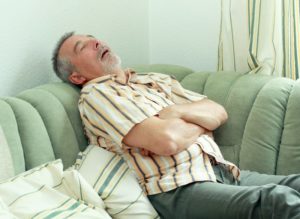The Connection Between Sleep Apnea and Type 2 Diabetes
November 20, 2019

If you have been diagnosed with type 2 diabetes, you likely do your best to eat right, exercise regularly, and see your doctor for regular checkups. But are you also monitoring the quality of your sleep? You should be aware of the connection between sleep apnea and type 2 diabetes because, as a type 2 diabetic, you are much more likely than the general population to suffer from sleep apnea. Together, these two conditions can lead to devastating consequences. Let’s talk about how you can stop them from ruining your health.
Complications of Diabetes and Sleep Apnea
Sleep apnea is a disorder wherein the soft tissues in the throat block the airway at night, thus hindering a person’s breathing and leading to greatly decreased sleep quality. Sleep apnea has a strong correlation to many systemic conditions, including cardiovascular disease, chronic fatigue, and elevated blood glucose levels. Left untreated, sleep apnea can contribute to the development of diabetes. If diabetes already exists, high blood sugar levels can interrupt the sleep cycle and further decrease the quality of a person’s sleep.
Why the Connection?
Diabetes and sleep apnea can have a direct effect on one another, but often, they reason they both exist is due to a completely different factor: obesity. While either condition can develop in individuals with a healthy BMI, they are more common in overweight and obese individuals. A poor diet may lead to obesity and diabetes. The increased weight and body fat of obese individuals contributes to a large neck circumference and more visceral fat (fat around the organs). The extra weight can cause the soft tissues in the throat and mouth to collapse, leading to the pauses in breathing that define sleep apnea.
Do You Have Sleep Apnea?
Everyone should be aware of the risk of sleep apnea, but if you are diabetic, you should be especially so. If the answer to two or more of the following questions is yes, you likely do have sleep apnea:
- Do you snore loudly?
- Are you constantly tired or fatigued?
- Has anyone observed that you have stopped breathing while asleep?
- Do you have high blood pressure?
Treating Sleep Apnea
If you suspect you have sleep apnea, seeking diagnosis and treatment will not only increase the quality of your sleep, but it may also make your diabetes easier to manage. There are a number of sleep apnea treatments available today, the most common of which is a CPAP machine, which gently forces air into the throat to prevent the airway from collapsing.
Another popular treatment is oral appliance therapy. It uses a small, mouthguard-like device to reposition the jaw at night in a way that prevents airway collapses. Many patients find an oral appliance to be more comfortable and convenient than a CPAP machine.
Sleep apnea and type 2 diabetes share a strong connection. Fighting both conditions head-on could improve your health and your quality of life!
About the Author
Dr. James Sierra is an experienced, highly trained dentist in Friendswood who wants his patients to enjoy optimum health from head to toe. He is proud to offer oral appliance therapy. If you would like to learn how he may be able to help you enjoy higher quality sleep, contact our office at 281-482-2631.
No Comments
No comments yet.
RSS feed for comments on this post.
Sorry, the comment form is closed at this time.

 Check-Ups
Check-Ups Dental
Dental 3-on-6™
3-on-6™ Cerec® Same-Day
Cerec® Same-Day Full Mouth
Full Mouth Invisalign®
Invisalign® Cosmetic
Cosmetic Sedation
Sedation